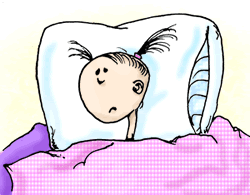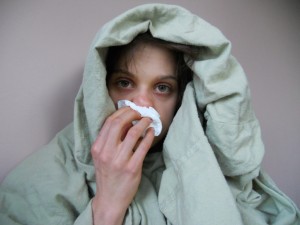What should you do if you are sick on the day of an interview?
Recently I chatted with representatives at a career fair on what happens if candidates are sick the day of a scheduled interview. I don’t mean “on your deathbed,” but generally feeling unwell due to the average flu or cold. Canceling a Career Services appointment is one thing – I appreciate when students get in touch when they are really sick and stay home, rest, and reschedule for a later date or call-in for their appointment instead (yup, we do phone appointments). However, an interview with a potential employer is much more “high stakes” – you are trying to show professionalism, and there are a limited number of opportunities to do so in a job search.
Overall, given the conversations I had with employers, my advice is that it is best if you show up for the scheduled interview, but it might depend where you are in the interviewing process. If you have made headway and have already had an interview round by phone or in person, it might be okay to ask if you can reschedule an upcoming in-person appointment. However, the overall message I heard from your potential interviewers is go through with the interview, even if you don’t feel well, rather than cancel, reschedule or otherwise not show up. One recruiter said that when she hears from people who call to say they are sick and wanting to cancel or change the date, she might not entirely believe them. Conversely, she suggested if you show up, even if you are sick, people will be “more understanding.”
Other recruiters also suggested doing a phone interview might be a good alternative (especially for a first round interview). That mode of interviewing has its limitations compared to being face-to-face with your interviewers, but we have some tips for managing phone interviews here and in another blog post.
My colleagues (other Penn career advisors) had a few more points to add in the way of advice. You will note there is not complete consensus on the issue of handling a mild illness when you are interviewing, except for the last suggestion – prevention:
- “Cancellation, except in the most dire of circumstances, is seldom a good option… do everything possible to prevent excessive nose running or coughing by taking appropriate (but not sleep-producing) meds, maybe drinking hot, herbal tea. Certainly, the candidate should be prepared with tissues, hand sanitizer, and be sensitive to how s/he manages his/her tissue disposal, coughing, etc. For example, one should make sure that s/he has VERY clean hands before the handshake and then offer hand sanitizer to the employer.”
- “I would suggest that students might even mention to the recruiter if they are feeling under the weather just so employers will realize they are not at their best on that particular day, but still took the time to show up.”
- “While it’s fine to disclose that you’re ‘under the weather,’ it should just be stated matter-of-factly, without the expectation of excessive sympathy or a ‘free pass;’ also, there are limits to how much information you should actually disclose about your illness” (in other words there is such a thing as TMI)
- “I believe if you are really sick, you need to see a doctor then cancel by phone/email if necessary. Otherwise, students should show up and do their best.”
- “I am not an advocate for disclosing that you are not well. If your symptoms (coughing/sneezing) are obvious, you can mention that you have been under-the-weather. When you start a job and you go into work, you wouldn’t be announcing to your boss that you are sick, unless they ask, or if your symptoms are obvious. I believe the candidate needs to follow through with the interview to show they are truly interested in the job and will do what needs to be done to complete the process. Just like at work.”
- “This is one of those ‘professional’ and adult life lessons – sometimes you don’t feel like doing something, certainly, but when the stakes are high, you must do your best and focus on the positives!”
Finally, and most importantly!
- Prevention is key~ Try “practicing good health habits like getting plenty of sleep, washing hands frequently, getting fresh air, eating well, and all the stuff our mothers told us in order to avoid getting sick in the first place.”



